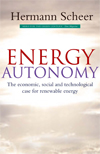
 Press release, Bonn, 13 July 2009
Press release, Bonn, 13 July 2009
Prof . Dr. Hermann Scheer, member of the German parliament, EUROSOLAR president and general chairman of the World Council for Renewable Energy, on the presentation of the DESERTEC Industrial Initiative in Munich today:
The Desertec project “Power for Northern Europe from the Sahara desert" is a Fata Morgana. The initiators know: There is no prospect of success. But for all that Desertec could be a good idea indeed. If the aim were to enable the Sahara countries to make the transition to energy generation completely from renewable sources, I would fully agree to the Desertec plan. The EU would make both an essential contribution towards stable economic and social prospects for the southern Mediterranean countries and to fighting climate change. Given their solar and wind power potentials, these countries would even be able to completely move to renewable energy for their electricity supply within less than 20 years. The beneficial effect to their economies would be much stronger compared with exporting power to Europe.
There are several essential reasons that the Desertec concept presented today for large-scale solar power exports to Europe is highly questionable. The expected costs are artificially down rated, while the possibilities to save costs when building the high voltage direct current transmission lines are highly overestimated. Even if the plan for supplying 15 per cent of the EU’s electricity demand with supposedly €400 billion cost of investment would be feasible; this would not at all be less costly than generating power from renewable energy within the EU itself. In Germany alone, since 2000 – that is within nine years – the percentage of electricity generation from renewable energy has increased to 15 per cent, while the volume of investment has been about €80 billion. The costs per generated kilowatt-hour keep falling constantly.
The new technological possibilities for storing solar and wind power within Europe go unnoticed by the Desertec concept, too. Quickly expanding the development of renewable energy within Europe requires decentralized dispatchable power generation that can be fed into the grid quickly, instead of base load power stations built in the desert.
Decentralized electricity generation from renewable energy, 100 per cent cost effective and flexible, will be possible here shortly, together with numerous producers. At a conference held in Kassel recently, 90 German towns and council districts have put forward their specific concepts on how they will achieve a 100 per cent electricity supply generated from local and regional sources by 2030 at the latest. Therein lies the dynamics of renewable energy. One truly major project, a counter to the Desertec concept in fact, has been in full operation since 2000 already: The Renewable Energy Sources Act, which has brought about hundreds of thousands of investors since.
Desertec advocates must also answer another crucial question: Where will happen the value add of renewable energy in future. There is a fundamental difference depending on whether renewable energy is produced in a decentralized manner and, the value add therefore is distributed to the decentralized producers, or whether it is produced by large utilities in a few large power stations concentrating the monopolistic value add.
Contact:
Helmut Lölhöffel, Communication
Tel.0049-(0)30-24628924
Mobile 0049-(0)173-6160004
This email address is being protected from spambots. You need JavaScript enabled to view it.



